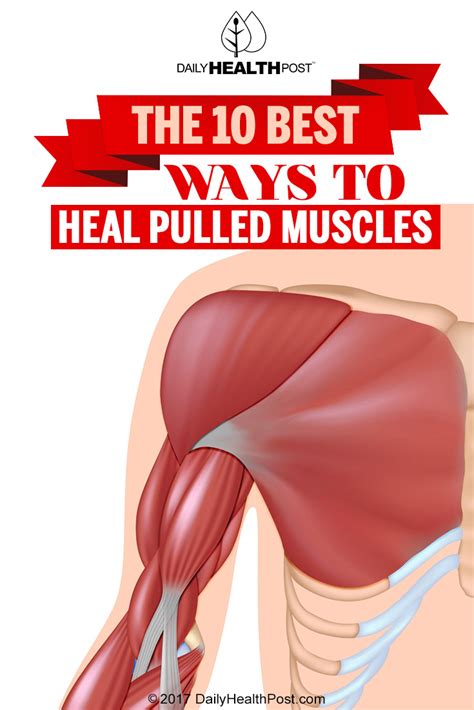Intro
The shoulder is one of the most mobile joints in the human body, and as such, it's also one of the most prone to injury. A pulled shoulder muscle, also known as a strained shoulder, can be a painful and debilitating condition that affects daily activities. The good news is that with proper care and treatment, it's possible to heal a pulled shoulder muscle and get back to normal in no time. In this article, we'll explore the importance of addressing shoulder injuries, the benefits of seeking medical attention, and the various ways to heal a pulled shoulder muscle.
A pulled shoulder muscle can occur due to a variety of reasons, including overuse, direct blows to the shoulder, or sudden movements. The severity of the injury can range from mild to severe, and if left untreated, it can lead to chronic pain, limited mobility, and even long-term damage. It's essential to seek medical attention if the pain persists or worsens over time, as a proper diagnosis and treatment plan can make all the difference in the recovery process. By understanding the causes and symptoms of a pulled shoulder muscle, individuals can take proactive steps to prevent future injuries and promote overall shoulder health.
The human body has an incredible ability to heal itself, and with the right approach, it's possible to accelerate the recovery process. When it comes to healing a pulled shoulder muscle, there are several strategies that can be employed, ranging from rest and physical therapy to medication and alternative therapies. By combining these approaches, individuals can create a personalized treatment plan that addresses their unique needs and promotes optimal healing. Whether you're an athlete, a weekend warrior, or simply someone who wants to maintain good shoulder health, this article will provide you with the information and tools you need to heal a pulled shoulder muscle and get back to living your best life.
Understanding Pulled Shoulder Muscle

Causes of Pulled Shoulder Muscle
The causes of a pulled shoulder muscle can be divided into two main categories: acute and chronic. Acute causes include direct blows to the shoulder, falls, or sudden movements, while chronic causes include overuse, poor posture, or repetitive strain. In some cases, underlying medical conditions such as tendonitis or bursitis can also contribute to the development of a pulled shoulder muscle. By identifying the underlying cause of the injury, individuals can develop a targeted treatment plan that addresses the root cause of the problem.5 Ways to Heal Pulled Shoulder Muscle

- Rest and Ice: The first step in healing a pulled shoulder muscle is to give the affected area plenty of rest. This means avoiding any activities that may have caused the injury in the first place, such as heavy lifting or throwing. Applying ice to the affected area can also help reduce pain and inflammation.
- Physical Therapy: Physical therapy is an essential part of the recovery process, as it helps restore mobility and strength to the affected area. A physical therapist can develop a personalized exercise program that targets the specific muscles and tendons affected by the injury.
- Medication: Over-the-counter pain medications such as ibuprofen or acetaminophen can help manage pain and inflammation. In some cases, prescription medications such as muscle relaxants or corticosteroids may be necessary to manage more severe symptoms.
- Alternative Therapies: Alternative therapies such as acupuncture, massage, or chiropractic care can also be effective in managing pain and promoting healing. These therapies can help reduce muscle tension, improve circulation, and promote relaxation.
- Surgery: In severe cases where the injury is caused by a torn tendon or ligament, surgery may be necessary to repair the damaged tissue. However, this is typically a last resort and is only considered when other treatment options have been exhausted.
Benefits of Physical Therapy
Physical therapy is a crucial part of the recovery process, as it helps restore mobility and strength to the affected area. A physical therapist can develop a personalized exercise program that targets the specific muscles and tendons affected by the injury. Some of the benefits of physical therapy include:- Improved mobility and range of motion
- Increased strength and flexibility
- Reduced pain and inflammation
- Improved overall shoulder health
Preventing Future Injuries

- Warm up and stretch: Before engaging in any physical activity, it's essential to warm up and stretch the affected area.
- Use proper technique: Using proper technique when lifting or throwing can help reduce the risk of injury.
- Strengthen the surrounding muscles: Strengthening the surrounding muscles can help provide additional support and stability to the affected area.
- Avoid overuse: Avoiding overuse and taking regular breaks can help reduce the risk of injury.
Common Mistakes to Avoid
When it comes to healing a pulled shoulder muscle, there are several common mistakes to avoid. These include:- Not seeking medical attention: Failing to seek medical attention can lead to further injury and prolonged recovery time.
- Not giving the affected area enough rest: Not giving the affected area enough rest can lead to further injury and prolonged recovery time.
- Not stretching or warming up: Not stretching or warming up before physical activity can increase the risk of injury.
- Not strengthening the surrounding muscles: Not strengthening the surrounding muscles can leave the affected area vulnerable to future injuries.
Conclusion and Next Steps

We encourage you to share your experiences and tips for healing a pulled shoulder muscle in the comments below. If you found this article helpful, please share it with your friends and family who may be struggling with shoulder injuries. By working together, we can promote overall shoulder health and well-being.
What are the common causes of a pulled shoulder muscle?
+A pulled shoulder muscle can occur due to a variety of reasons, including overuse, direct blows to the shoulder, or sudden movements. The severity of the injury can range from mild to severe, and if left untreated, it can lead to chronic pain, limited mobility, and even long-term damage.
How long does it take to heal a pulled shoulder muscle?
+The recovery time for a pulled shoulder muscle can vary depending on the severity of the injury. Mild cases may take a few days to a week to heal, while more severe cases can take several weeks or even months to recover.
What are some effective ways to prevent future shoulder injuries?
+Preventing future shoulder injuries requires a combination of proper technique, stretching, and strengthening the surrounding muscles. It's also essential to avoid overuse and take regular breaks to reduce the risk of injury.
